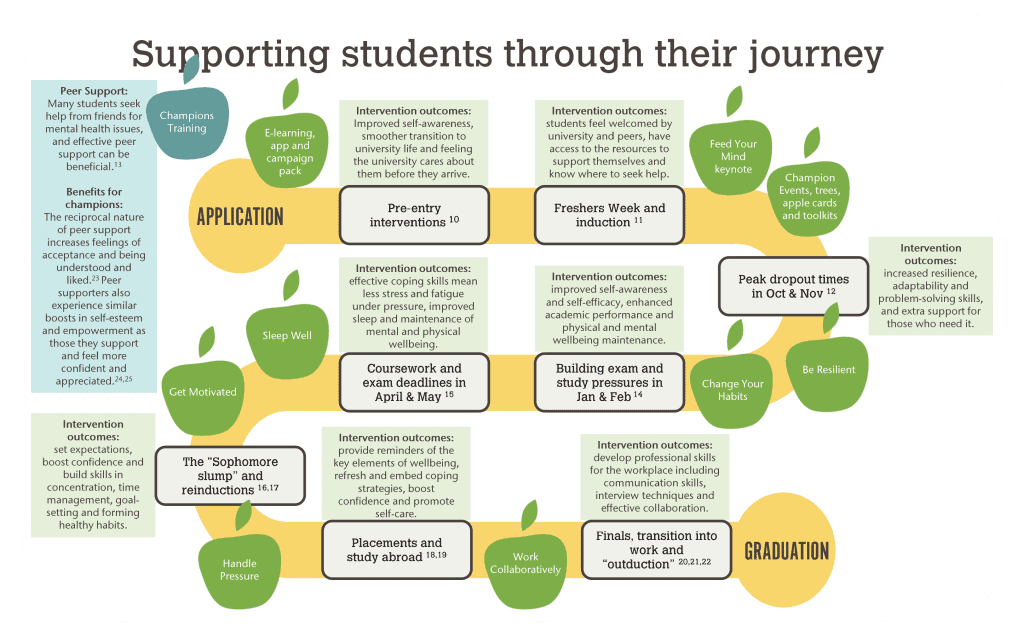
In our last blog, we considered the transition to university, exploring how to connect with students before they arrive and throughout their first year. This month, we’re focussing on supporting second year students, thinking about the changes they might face, what they might find challenging, and how we can help.
At Mindapples, we plan our support around a clear student journey, built from current sector guidance, so that it aligns with what changes from year to year. It draws on evidence from the University Mental Health Charter, which states that a student’s time at university is a series of transitions, and on Michelle Morgan’s guidance about what returning students need.
Second-year students often benefit from two steps: a re-orientation and a re-induction.
A re-orientation is a clear update at the beginning of the year that explains, for example, how assessments have changed, how much independent study is expected of a student, and where to find both personal and academic support.
A re-induction often continues throughout the first term (or longer) and helps students to build the skills they need at this stage of their degree. Skills like planning and time management for assignments and exams, understanding marking criteria and standards and using feedback to inspire action. Re-induction can also offer ways to handle academic anxiety or fluctuating mood, and provide clear signposting to further help.
We know that student wellbeing and engagement can dip after the first year. Progressing between levels of study, perhaps moving abroad for part of their degree, being on professional placements, and thinking about and planning for life after graduation can all add pressure too. Many second-year students experience “the sophomore slump,” a drop in motivation and enjoyment, and some students also feel more anxious about their learning and less confident about achieving their goals. And we can understand why.
As the academic expectation increases, there is more independent learning needed, and in many programmes, the second year counts towards their degree classification. So, the pressure feels like it’s growing. Often students move out of halls of residence into private accommodation, which can feel like quite a contrast from the supported living style of halls. Then there’s the perception for some that “be more independent” translates into “do not ask for help,” so it’s important to keep routes to support visible and make services easy to find across the university. Many students also have caring responsibilities, are commuting, and are balancing study with work, so time for independent study can be reduced just as the demand to study grows.
The good news is that when universities support students ahead of and during these transitions, the impact is positive. Clear re-orientation and a practical re-induction give second-year students a solid understanding of what’s expected, a chance to create better habits, and clearer routes to help, so the year feels more manageable and more enjoyable.
So, where can Mindapples help?
Second year can bring a dip in motivation and enjoyment. Rather than relying on willpower, which drains energy, we look at what really drives us to succeed. External incentives alone are not enough; we also need to connect them with our inner drivers and feel that we have the ability to succeed. That perceived ability can be the difference between a challenge we want to tackle and a task we would rather avoid. But by keeping these three ingredients in view, students can spot what is missing and make a small, targeted change. It is a practical way to restart momentum when confidence wobbles.
The workload increases in second year, and time can feel tight. Our focus here is on managing minds better, so that effort goes where it counts. Concentrated thought is tiring, so we work with energy as well as time: give fresh hours to complex, high-value work and save simpler tasks for later. That means tuning out distractions when you need to focus, and building habits that handle everyday jobs more efficiently. Because everyone works differently, students are encouraged to find what works for them. This turns increased independent study and early assessments into a calmer plan, and helps make more time for what matters.
Pressure around early assessments can make emotions take over. We start by recognising that emotions drive action and shape choices, and most of the time they help, but sometimes they distort our thinking. When fear or anger begin to run the show, we teach straightforward ways to steady the system: deal with physical symptoms, create a little distance before responding, and use simple cognitive techniques to keep the mind calm. We also show how thoughts, feelings, and behaviour can loop together, and how to break those loops. This helps students handle pressure well and reach out for support sooner, rather than going it alone.
Second year brings new expectations and a different rhythm and routine to study and student life. It helps to be clear about what has changed from year to year, to build routines, knowledge and skills that fit real student life, and to keep routes to academic and personal support easy to find. Through re-orientation and re-induction, Mindapples can help students and institutions understand what drives them, organise their effort and energy around the work that matters, and build knowledge and skills that hold up when the pressure rises.
If you would like help planning support for second year students get in touch students@mindapples.org and we can talk about what would work at your university.

